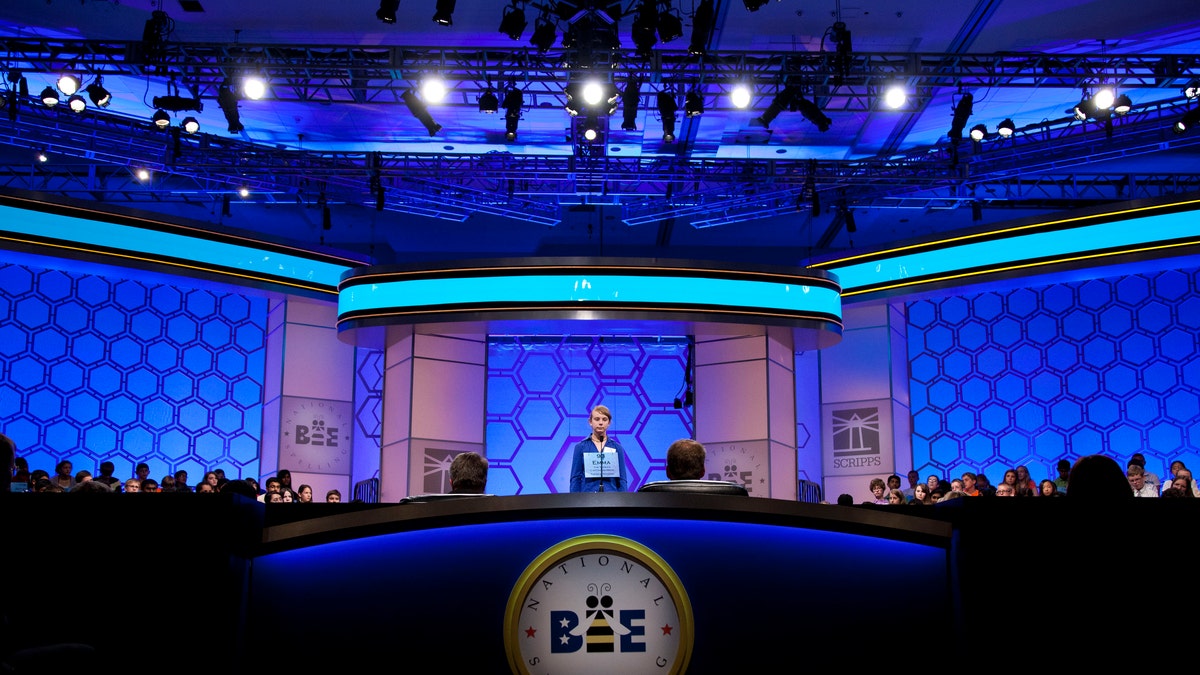
May 30, 2012: Emma Steimle of Lawrence, Kansas spells her word during the third round of the National Spelling Bee in Oxon Hill, Md. (AP)
OXON HILL, Md. – Lena Greenberg was in constant motion as she stood waiting for her turn at the microphone at the National Spelling Bee -- arms waving, feet dancing, head bobbing.
"It calmed me down," Greenberg said later, although she certainly never looked calm.
Speaking in a loud, high-pitched voice, she spelled the words "jong" and "thalian" correctly. When the judges nodded their heads, she sprinted and skipped back to her chair and doubled over in delight.
Greenberg, 14, of Philadelphia, was one of 50 spellers to advance to the semifinals of the 85th Scripps National Spelling Bee on Wednesday after 228 participants were eliminated. Last year, she missed the semifinals by one point.
Thursday's semifinals will not include the youngest speller in bee history, 6-year-old Lori Anne Madison of Lake Ridge, Va., although she made a valiant effort. Lori Anne misspelled one of her two words during the preliminary rounds -- "ingluvies," which she started with an "e" -- and her score on Tuesday's computer test wasn't enough to make up the difference.
"It was close," said spelling bee director Paige Kimball.
Only one semifinalist advanced with a perfect score -- 10-year-old Vanya Shivashankar of Olathe, Kan. Vanya's sister, Kavya, won the 2009 National Spelling Bee. On Wednesday, the fifth-grader spelled "debellation" and "auteur" with obvious ease, and she got all 25 scored words right on Tuesday's 50-word computer test -- including "semelparous" and "outrecuidance."
Like her sister, Vanya aspires to be a surgeon, and she's part of a customarily strong contingent of Indian-Americans in the semifinals. Spellers of Indian descent have won four years in a row and nine of the last 13 years, a run that began when Nupur Lala captured the crown in 1999 and was featured in the documentary "Spellbound."
Last year, five spellers got perfect scores, and semifinalists could only afford to miss two words. This year's test was much more difficult -- so 17 out of 25 was enough to advance.
Two of last year's finalists also advanced -- Nabeel Rahman of Buffalo, N.Y., and two-time finalist Arvind Mahankali of Bayside Hills, N.Y.
While 6-year-old Lori Anne was the talk of the spelling bee, Wednesday belonged to the veterans. In contrast to Greenberg's jitters, five-time National Spelling Bee participant Nicholas Rushlow was the picture of cool as he strutted to the microphone and greeted pronouncer Jacques Bailly.
Rushlow, a year-round competitive swimmer who reads "Get Fuzzy" comic books to relax before spelling, made the semifinals for a fourth time.
"I don't know what I'm going to do after this bee," he said. "I'll have to find a new hobby."
Rahul Malayappan of Danbury, Conn., the other fifth-time participant, also made the semifinals. Emily Keaton of Pikeville, Ky., made them for the third time in four appearances.
"It's still a big deal," she said. "Everyone wants to do better than you've done before."
Three foreign competitors made the semifinals: Mignon Tsai of Vancouver, Jennifer Mong of St. John's, Newfoundland, and the unfailingly polite Gifton Wright of Spanish Town, Jamaica, who said "Thank you, sir" every time Bailly gave him a definition or word origin.
This week, Scripps announced tentative plans for a world spelling bee with teams of spellers from dozens of countries. Once that gets off the ground, the National Spelling Bee would be closed to international participants.
This year's winner gets $30,000 in cash, a trophy, a $2,500 savings bond, a $5,000 scholarship, $2,600 in reference works from the Encyclopedia Britannica and an online language course.
Most spellers have a routine, asking for the definition and country of origin even if they know the word immediately. Many pretend to write the words on their hands or arms. But some are confident enough to wing it.
Wearing a black hoodie, T-shirt and blue jeans, Dylan Bird, 13, of Pebble Beach, Calif., greeted Bailly with "'Sup?" before spelling "catalineta." Earlier, he spelled "corpuscle." Neither time did he ask for so much as a definition.
"I never really felt the need," said Bird, a second-time participant. "With experience, you kind of are able to relax a bit more."
His nonchalance apparently didn't work as well on the computer test. Bird didn't make the semifinals.
Neither did Jack Pasche, 13, of Sutton Bay, Mich., whose attempt to spell "idiosyncratically" was, well, idiosyncratic.
"I-O-Q-R-S-Z-quatro," he said, before laughter drowned him out.









































